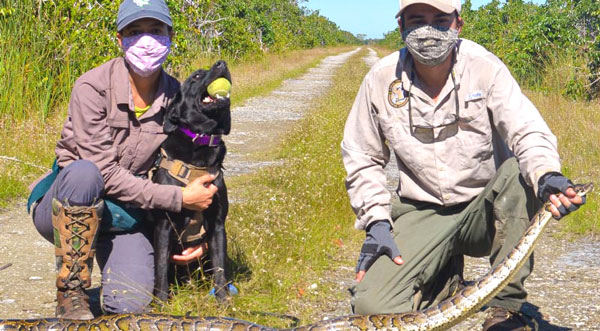WATCH: Florida Wildlife Conservation Commission’s Detector Dog Removes First Wild Python
By Florida Fish and Wildlife Conservation Commission // December 20, 2020
Contact FWC Exotic Species Hotline at 888-Ive-Got1 if you come across a python
ABOVE VIDEO: FWC’s new Detector Dog Team is now up and running.
(FWC) – The FWC is implementing a new tool to help find invasive Burmese pythons in the Everglades ecosystem.
The FWC’s new Detector Dog Team is now up and running, removing Burmese pythons from the wild.
Detector dogs have been trained to find a wide variety of animals, from bed bugs to sea turtle nests and now the FWC is using them to sniff out Burmese pythons.
A black lab named Truman and a point setter named Eleanor to go out five days a week with a dog handler and an FWC biologist to search for pythons on different public lands across south Florida.

Truman and Eleanor spent over a month training to be a part of the FWC detector dog team, learning to search for pythons using scent signals and to alert dog handlers when they find one of these large constrictors.
Python-scented towels and live pythons with surgically implanted trackers were used to train the dogs on python scent.
The dogs were also trained to ignore distractions, such as other live animals, when working in an outdoor environment and worked on building up their stamina so they do not tire easily in the field.
When Truman or Eleanor catches the scent of a python, they follow that scent until they are within approximately 3 feet of the python.
When they find a snake, the dogs alert the handler and are rewarded with a recognition response.

The dog and handler then back away from the area, clearing the way for the FWC biologist to pinpoint the exact location so they can safely catch and remove the python from the wild.
If you suspect you have found a python, please report it to the FWC’s Exotic Species Hotline at 888-Ive-Got1.















